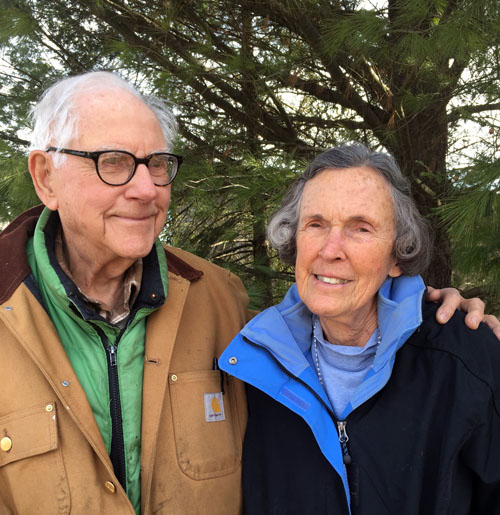Finding a Way of Life on Windy Acres Farm
[This article was previously published in the winter issue of The Cultivator, Cornucopia’s quarterly newsletter.]
by Jason Cole,
Research Associate at The Cornucopia Institute
 |
What is the meaning and purpose of work? Is it simply a means of making a profit and accumulating wealth? Can work build community and nurture the creation? Are we simply miners of the soil, taking all we can get, or are we caretakers so that future generations will also receive the blessing and benefit of the good land?
These were some of the questions that Alfred and Carney Farris came to consider in the 1970s, soon after they moved back to family land in the northern Tennessee foothills of the Appalachian Mountains. There, they began a lifetime learning process through their stewardship of what would become Windy Acres Farm.
Though they both grew up on what might be called “hobby farms,” Alfred and Carney came late to full-time farming, just as Alfred was approaching his 40th birthday. Initially, they farmed like everyone around them, depleting the soil and degrading the land with chemicals and synthetic fertilizers.
Alfred and Carney soon developed relationships with a growing community of idealistic young Christians in the area who had come of age during the environmental movement of the late 1960s and whose perspectives challenged them to “rethink what it means, as followers of Jesus, to care for His Garden.”
For the Farrises, this came to mean two things: 1.keeping healthy soil on farms, and 2.keeping healthy farms on the soil. To keep healthy soil on their farm, the Farrises sought to change their agricultural practices to be more sustainable. They were told by the contract farmer working their family’s land that the kind of chemical-free agriculture they were interested in was impossible.
Undeterred, they traveled to the Rodale Institute in Kutztown, Pennsylvania and began reaching out to other farmers who were successfully employing organic practices. They not only learned that chemical-free farming was possible, but they also became passionate advocates of the need for a paradigm shift in how we steward the land and its precious resources.
It took the Farrises decades to learn how to grow with the land and climate, rather than fight against it. But by 2000, they had obtained their USDA organic certification for both crops and pasture, and their diverse system of rotations was beginning to get the attention of others.
Early on, the abundance of weeds in their fields made clear that livestock were a necessary component of a sustainable organic farm. They started with a few British White cattle, a heritage breed known for its ability to thrive exclusively on pasture, and today maintain a herd of almost 50. More recently, they began to raise sheep as well.
The land is managed on a six-year rotation. The livestock graze for three years, then a cover crop of vetch and clover is planted to provide green manure back to the soil before being rolled down using Rodale’s no-till system. This cover crop is followed by soybeans or grains, and then goes back to grass.
“We always want something green growing on the soil, capturing the sun’s energy and producing living roots to feed the microbes,” explains Alfred.
Today, Windy Acres Farm comprises 470 acres of certified organic grain crops and pasture. The Farris family markets grass-fed beef in the rapidly expanding metro region of Nashville.
Their grain crops include corn, soft red winter wheat, barley, clear and dark hilum soybeans, oats, rye, hairy vetch, and open-pollinated white and yellow corn. Around 70% of their grain sales, by dollar value, are sold direct to customers in the area as specialty feed for chickens, milk goats, or other livestock.
The Farrises describe their methods as “part of the solution to our broken industrial agriculture model, which is dependent on massive, long-distance transportation, fossil fuels, and markets dictated by speculators.” In a truly local market, the farmer and the customer work together to support a more balanced and regenerative system. According to Alfred, “I would like to never again ship a semi load of grain.”
Their second goal of keeping healthy farms on the soil is another matter. Windy Acres Farm is protected under the Land Trust of Tennessee. “This will protect it from development and save it for future generations of farmers,” says Alfred. “Our land will never see a shopping mall or subdivision. This will not, however, protect it from bad farming practices. For that, I would like to see an agrarian trust that could step in and protect the land further.”
Farm land in northern Tennessee has recently sold for as high as $13,000/acre, yet commodity prices remain very low. The Farrises are concerned this discrepancy will lead to non-farmers, corporations, or even foreign investors owning the land.
“Today, the only way a farmer can get started in this area is by inheriting land or marrying into it,” says Carney. “We need to find a new way for young farmers to acquire land so they can work it responsibly and successfully.”
For now, the Farris family continues to learn from, and give back to, their land, as they have for nearly fifty years. “We have truly been blessed during these years, as we have actually discovered and proven that organic farming can work and that we can be a part of the restoration of the Lord’s Vineyard.”

